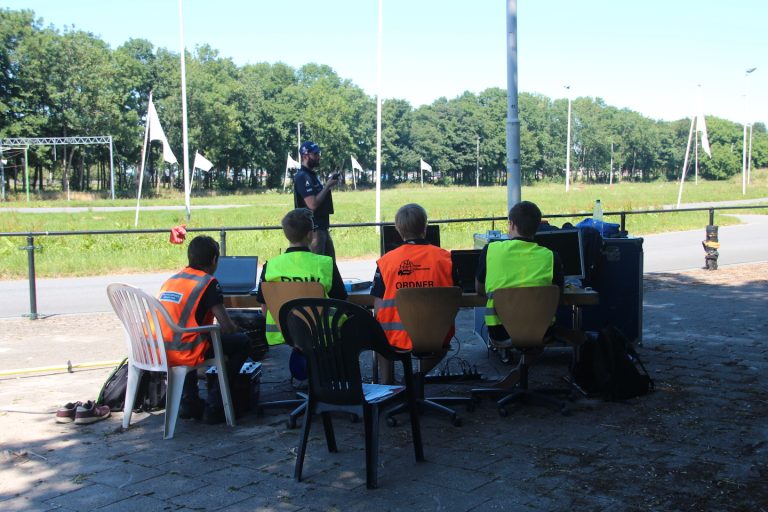The Forze team has tested its newest model, the Forze VIII, on the track. The hydrogen car is now almost ready to take part in the world record Elfwegentocht parade next weekend and in the Supercar Challenge at the TT circuit in Assen in August.
Forze VIII during the track test. (Photo: Forze)
The TU Delft Forze dream team ran the new hydrogen car on a track for the first time on Thursday, 5 July. Forze VIII was tested at low speed, between 15 km/h and 20 km/h, at the RWC Ahoy cycling track in Rotterdam.
The conditions were hard, said the team, as the low speed combined with high temperatures made it difficult to cool down the systems. The car had to be restarted several times, but the data recorded by different sensors during the test will help engineers improve some of the car’s systems before the next test.
The new Forze car has undergone major changes from last year’s model, including a completely new bodywork. Improvements in the suspension allow the car to run faster, while a lighter and more efficient cooling system, similar to the one used in Formula E cars, keeps it from overheating. The tanks have also been replaced by bigger ones that can carry enough hydrogen to drive for almost one hour at maximum racing power.
Forze wants to show that sustainable cars can run faster than fuel vehicles
Forze VIII was presented at the 24 hour Nürburgring event in May, and in June it had its components tested individually in a dyno test in the Dream Hall. Later this month the team will use the same track to test the car at higher speeds, and the final test to push Forze VIII to its limits will be held at the circuit of Zandvoort.
Next Saturday, 14 July, Forze VIII will join the Elfwegentocht parade in Friesland that is trying to break the world record for the longest sustainable parade. But the biggest competition it will take part in will be the Supercar Challenge race, at the TT circuit in Assen on 18 and 19 August.
Forze VIII will be the only hydrogen-powered participant in the Supercar Challenge and will compete against cars running on petrol. The Forze team’s goal is to show that sustainable cars can run even faster than fossil fuelled vehicles.
Because there are no dedicated races for hydrogen vehicles, the Forze team is competing against petrol cars. However, this could change soon, as the International Automobile Federation (FIA) and the Automobile Club de l’Ouest (ACO) have announced plans to introduce a hydrogen division at the classic 24 Hours of the Le Mans race from 2024.
The Forze dream team has designed and built hydrogen racing cars for a decade, with the aim to promote hydrogen as a sustainable energy carrier. To propel these cars, a fuel cell combines hydrogen (stored in tanks) and oxygen (taken directly from the air) to create a chemical reaction. Then, it converts the chemical energy into electricity. The only by-product of this chemical reaction is water vapour, making Forze a zero-emission vehicle.
 Forze engineers will use data recorded by sensors during the test to improve the car. (Photo: Forze)
Forze engineers will use data recorded by sensors during the test to improve the car. (Photo: Forze)Maria Rubal / science editor


Comments are closed.